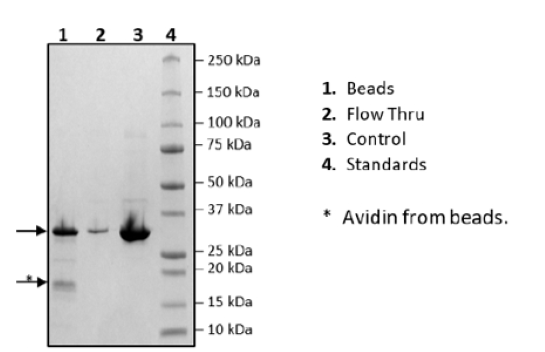JAK3, Avi-Tag, His-Tag, Biotin-Labeled Recombinant
Recombinant human JAK3 (Janus Kinase 3), encompassing amino acids 511-790 corresponding to the pseudokinase domain (JH2 domain) which lacks enzymatic activity. This construct contains a C-terminal Avi-Tag™ followed by a His-tag (6xHis). This protein was affinity purified.
≥90%
Aqueous buffer solution.
40 mM Tris-HCl, pH 8.0, 110 mM NaCl, 2.2 mM KCl, 20% glycerol, and 3 mM DTT
This protein is enzymatically biotinylated using Avi-Tag™ technology. Biotinylation is confirmed to be ≥90%.
In mammals, there are four JAK tyrosine kinases: JAK1, JAK2, JAK3 and TYK2. They are found in the cytosol. JAK3 is involved in signaling in response to cytokine activation of type I receptors that have γc chains (such as IL-2R, IL-21R and IL-15R). JAK3 plays roles in cell growth, survival, differentiation and EMT (epithelial to mesenchymal transition), and can be found in T cells, NK cells and intestinal epithelial cells. Inactive JAK3 results in SCID (severe combined immunodeficiency disease), while hyperactivation can lead to cancer and autoimmune disorders. Activated JAK phosphorylates tyrosine residues in the receptor, allowing the binding of STAT (signal transduction and activators of transcription) and their phosphorylation. Phosphorylated STAT factors dimerize and move to the nucleus where they regulate specific gene expression. The JAK3 inhibitor tofacitinib is in clinical trial for the treatment of psoriasis and organ rejection after transplant, and it is commercially available for rheumatoid arthritis. The development of new JAK3-related therapies will open new therapeutic avenues in cancer and autoimmune disorders.



